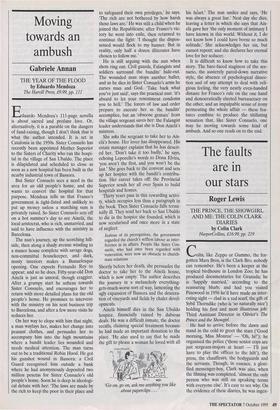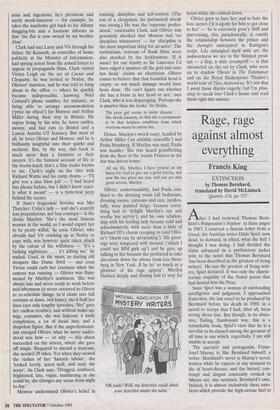The faults are in our stars
Roger Lewis
THE PRINCE, THE SHOWGIRL AND ME: THE COLIN CLARK DIARIES by Conn Clark HarperCollins, £16.99, pp. 219 Colin, like Zeppo or Gummo, the for- gotten Marx Bros, is the Clark Bro. nobody can remember. He's been a keeper at the tropical birdhouse in London Zoo; he has produced documentaries for Granada; he is 'happily married,' according to the reassuring blurb; and had you visited Pinewood in 1956 he'd have made an inter- esting sight — clad in a red scarf, the gift of Sybil Thorndike (who is `so naturally nice') holding his first and most illustrious job: Third Assistant Director in Olivier's The Prince and the Showgirl.
He had to arrive before the dawn and stand in the cold to greet the stars ('Good morning, Miss Monroe' — 'Oh, hi!'); he organised the police ('those senior cops are just sergeant-majors at heart — I'll just have to play the officer to the hilt), the press, the chauffeurs, the bodyguards and the servants. Though, in essence, a glori- fied messenger-boy, Clark was also, when the filming was completed, 'almost the only person who was still on speaking terms with everyone else'. It's easy to see why. On the evidence of these diaries, he was ingen- uous and ingenious; he's persistent and nicely mock-innocent — for example, he takes the wardrobe girl back to his Albany shagging-bin and a footnote informs us that 'the flat is now owned by my brother Alan'.
Clark had met Larry and Viv through his father. Sir Kenneth, as controller of home publicity at the Ministry of Information, had sprung actors from the armed forces to appear in propaganda films. Clark visited Vivien Leigh on the set of Caesar and Cleopatra, he was invited to Notley, the Oliviers' mansion, and he was told to hang about in the office — where he quickly became indispensable, knowing Noel Coward's phone number, for instance, or being able to arrange accommodation ('price no object') for Monroe and Arthur Miller during their stay in Britain. He enjoys living by his wits; he loves castles, money, and fast cars (a Bristol and a Lancia Aurelia GT feature). But most of all, he loves Olivier and Monroe, and he is brilliantly insightful into their quirks and methods. But, by the way, this book is much more than a footnote to their careers. It's the funniest account of life in the booby-hatch that's a film studio known to me. Clark's night on the tiles with Richard Wattis and his camp chums — 'I'll give you a nice blow job' — 'I had heard this phrase before, but I didn't know exact- ly what it meant' — is a hysterical peep behind the scenes.
If Alan's tragicomic heroine was Mrs Thatcher, Colin's lady — and she's scarcely less preposterous, nor less contrary— is the divine Marilyn: 'She's the most famous woman in the world, so I would expect her to be pretty wilful,' he coos. Olivier, who already had Viv cracking up at Notley to cope with, was however quite taken aback by the extent of the wilfulness — 'It's a fucking nightmare . . . it's killing me,' he wailed. Used, in the main, to darling old troupers like Dame Sybil — and even Vivien could curb her craziness when the camera was running — Olivier was flum- moxed by Marilyn's scattiness. She was always late and never ready to work before mid-afternoon (it never occurred to Olivier to re-schedule things: he'd climb into full costume at dawn, and fume); she'd fluff her lines (not only lengthy speeches, 'No!' gave her endless trouble); and without make-up, wigs, costumes, she was hideous: a nasty complexion, a lot of facial hair, and a shapeless figure. But if the unprofessional- ism enraged Olivier, what he never under- stood was how — or why — this chaos succeeded on the screen, where she gave off magic. Required to ascend a staircase, she needed 29 takes. Yet when they viewed the rushes of her 'historic labour', she 'looked lovely, acted well, and stole the scene'. As Clark says, 'Drugged, confused, frightened, late, vague, maddening as she could be, she changes any scene from night to day.'
Monroe undermined Olivier's belief in training, discipline and self-control. (The son of a clergyman, his puritanical streak was strong.) He was the 'supreme profes- sional,' vouchsafes Clark, and Olivier was genuinely shocked that Monroe had `no discipline whatsoever' — for 'discipline is the most important thing for an actor'. The technicians, veterans of Rank films, were also shocked by the fecklessness: 'If it wasn't for our loyalty to Sir Laurence I'd have edged a spanner off the grid and onto her head,' claims an electrician. Olivier comes to believe that that beautiful head is empty, so not much damage would have been done. 'He can't figure out whether she has a brain in her head or not,' says Clark, who is less disparaging. 'Perhaps she is smarter than she looks,' he thinks.
The poor girl seems to invite disaster . . . She needs calamity, so that she is permanent- ly in that helpless condition from which everyone wants to rescue her.
Hence, Marilyn's weird court, headed by Arthur Miller Can amiable crocodile') and Paula Strasberg. If Marilyn was mad, Paula was madder. She was heard genuflecting from the floor of the Austin Princess as the star was driven home:
All my life, Marilyn, I have prayed on my knees for God to give me a great actress, and now He has given me you, and you are that great actress, Marilyn ...
Olivier, understandably, had Paula con- fined to the dressing room (all bedrooms, dressing rooms, caravans and cars, inciden- tally, were painted beige, because every- thing had to 'delight Marilyn's eye and soothe her nerves); and his own relation- ship with his leading lady became cold and schoolmasterly, with more than a little of Richard III's charm creeping in (and Olivi- er's 'charm can be devastating'). His greet- ings were tempered with menace ('which I could see MM pick up') and he gave up talking to her because she preferred to take directions down the phone from Lee Stras- berg in New York. If he let `so much as a glimmer of his rage appear', Marilyn blushed deeply and filming had to stop for 'Oh yeah? Well, my detective could drink your detective under the table.' hours while she calmed down.
Olivier grew to hate her, and to hate the love scenes ('it is agony for him to get close to her' — 'he is extremely grim'). Stiff and patronising, this, paradoxically, is exactly the relationship between the prince and the showgirl anticipated in Rattigan's script. Life entangled itself with art; the awkwardness we see in the finished prod- uct — a flop, a stale creampuff — is that chronicled on the set by Clark, who went on to shadow Olivier in The Entertainer and on the Royal Shakespeare Theatre's world tour of Titus Andronicus. It's not that I await those diaries eagerly, but I'm plan- ning to sneak into Clark's house and read them right this minute.











































































 Previous page
Previous page